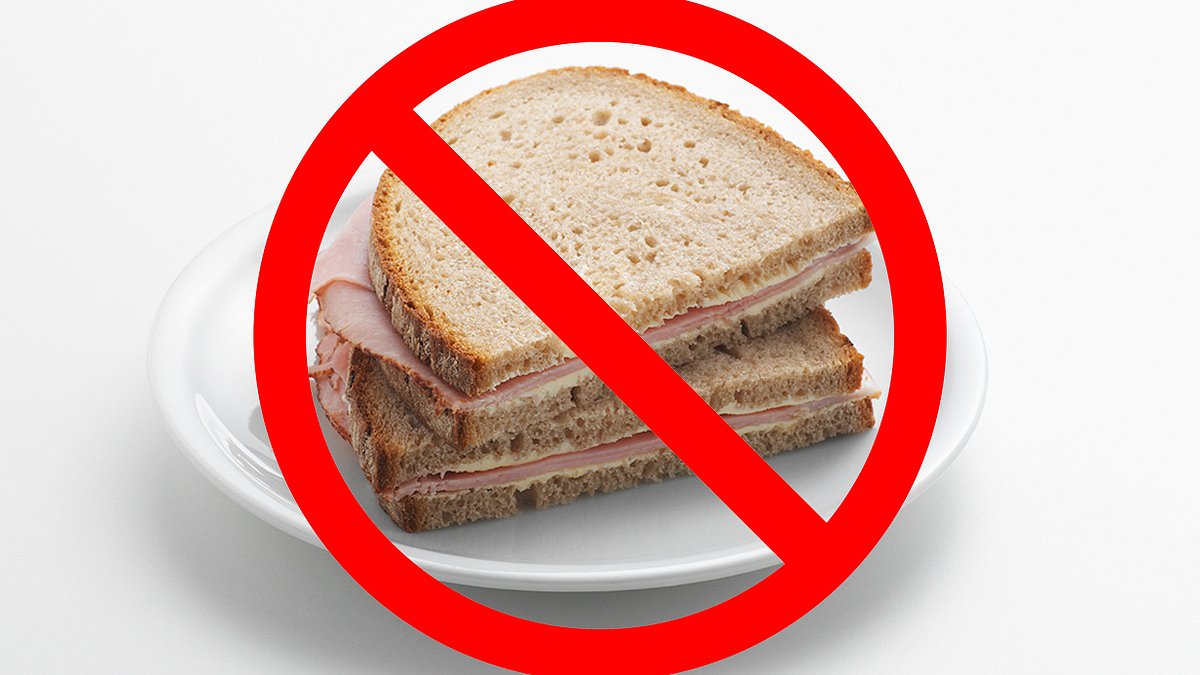South will ban s of ham sandwiches on public transport in a bid to tackle childhood and adult obesity.
Set to be enforced from July 1, the ban will remove items which are considered as junk food from being advertised on Adelaide’s buses, trains and trams.
The items include processed meats, including ham, as well as lollies, chocolate, desserts, soft drinks, chips, ice creams and other confectionary products.
Removing the s is a measured strike designed to limit the state’s children from being exposed to unhealthy food and drink advertising.
Leading marketing industry body n Association of National Advertising (AANA) has criticised the move, claiming the ‘blanket ban’ was drastic and unjustified.
‘As it stands, this policy bans all processed meats, which means a simple ham salad sandwich can’t be advertised,’ AANA CEO Josh Faulks told Newswire.
‘This simply doesn’t make sense and the government should be making evidence-based decisions, not blanket bans that don’t align with nutritional science.’
Mr Faulks warned the policy would have a negative impact on charities and businesses as it would prohibit all ads showing the banned products.
He said the AANA opposed all advertising bans for food and beverages, with the peak body urging the state government to adopt a ‘science-based approach’.
Under a science-based approach, a nutrient profiling scoring criteria would be used to determine which foods should be restricted from being advertised, Mr Faulks explained.
He said under the planned ban, an ad showing a birthday cake celebrating the anniversary of a children’s charity would not be allowed.
Mr Faulks added even events like Tasting would not be allowed to show any images of charcuterie boards or pastries in any s.
Government figures show some 35 per cent of children and 63 per cent of adults in South are overweight or obese.
Health Minister Chris Picton hit out at AANA’s stance, claiming the body was ‘scaremongering’.
He accused the body of providing misinformation about the policy and that it did not have the authority to decide what was displayed on public transport.
‘These lobbyists want to force the State Government to keep having junk food ads on our own buses amidst an obesity crisis,’ Mr Picton said.
‘The policy applies to government-owned Adelaide Metro buses, trains and trams. It is not up to advertising industry lobbyists to tell us what can be displayed on our public transport assets.’
Mr Picton added the children are bombarded with unhealthy food and drink ads, which has been long recognised as having a negative impact on their diets.
It’s understood Mr Faulks’ claim that Tasting ads could be banned is false, as the items on a charcuterie board would appear as ‘incidental’ and ‘unbranded’.
Under the proposed policy, ads that feature incidental food or drink items that are unbranded and generic would be permitted, even if the items are considered as unhealthy.
The ban has also been backed by a number of organisations including Preventative Health SA and the Cancer Council.
In 2022, Cancer Council warned parents to stop putting cold, processed meats in their children’s school sandwiches as there was a link between the food items and an increased risk of bowel and stomach cancer.
The n Dietary Guidelines labelled the foods as ‘discretionary’ – like cakes and biscuits – and therefore advised processed meats should be eaten occasionally.
In 2019 the Cancer Council sparked controversy after telling parents to to avoid adding muesli bars, ham sandwiches and savoury biscuits to their children’s school lunch boxes.
Muffins, biscuits, crackers with cheese spread and fruit boxes were all dubbed snacks families should avoid buying at the supermarket, in a list of ‘unhealthy snacks’ shared by the Cancer Council.
Instead of a muesli bar, the organisation suggested parents whip up a homemade version, or some zucchini, broccoli and cheese hashbrown cups – which are shredded hashbrowns baked into the shape of a cup and filled with various toppings.
Alternative options for a slice of cake included fruit loaf and pumpkin and sweet potato scones.
For fruit juice, milk or water was suggested instead, and for a bag of biscuits, parents were encouraged to consider giving their kids pita bread and roast vegetable dip, or vegetable muffins.
Popcorn and roasted chickpeas were other options parents were told to consider over a packet of chips.
